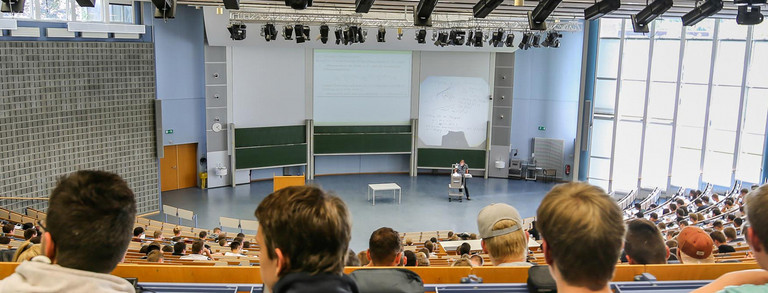Physics
Summary
| Degree | Bachelor of Science (B.Sc.) |
|---|---|
| Subject group | Natural Sciences and Computer Sciences |
| Standard program duration | 6 semesters |
| Admission requirements |
none
|
| Start of studies |
Winter semester
|
| Language | German |
| Enrollment requirements | |
| Further information | Website of Department of Physics |
| Department | Department of Physics |
Overview
Physics seeks to measure quantifiable natural phenomena by means of targeted experiments and to describe them theoretically using the simplest possible fundamental models. In a constant cross-fertilization of experiment and theory, physics today has penetrated into the areas of the largest dimensions, in astrophysics, as well as those of the smallest dimensions, in elementary particle physics. Anchoring the integration of experiment and theory that has been so successful in research in education, as well, is one of the guiding principles of the Physics program at TU Dortmund University.
The basis of the Bachelor’s degree program is the four-semester "integrated course" (Physics I-IV), which is designed and conducted jointly by an experimental and a theoretical lecturer. Exercises are carried out twice a week in small groups to discuss and delve deeper into the lecture material. This includes mechanics, thermodynamics, and relativity (I); electrodynamics (II); waves and fields, optics, and analytical mechanics (III); and finally atomic physics and quantum mechanics (IV). In addition, a beginner physics internship takes place in the third and fourth semesters. Other components of the Bachelor’s degree program are the minor subjects of mathematics (with lectures and exercises) and either chemistry (with a lecture and an internship) or computer science (with a lecture course including exercises and an associated internship). Also, there are mandatory courses from the field of physics, the general specialization outside of physics, and the area of specialization within physics. The program concludes with the writing of the Bachelor's thesis.
Skills and knowledge
Good mathematical knowledge is important for this course of study. Therefore it is a mandatory prerequisite for enrollment to take a mathematics self-test, which is carried out online. Attending the preparatory course in mathematics before beginning studies is strongly recommended.
Field of activity
The traditional career fields for physicists are research, development, and teaching in both the public sector (universities, research institutes, and government agencies for example) and the private sector (electronics industry, chemical industry, medical technology, mechanical and vehicle engineering, etc.). In addition, however, the breadth of training provided by the study of Physics increasingly opens up access to employment in nontraditional areas such as information technology and telecommunications, business consulting, and banking and finance, so that career prospects are good for Physics graduates, with or without a doctoral degree, even in economically difficult times. The crucial factors that enable physicists to be successful in their work, whether in traditional or new career fields, are the broad basic training and the ability, also cultivated in the course of study, to analyze and solve complex technical-scientific problems.
Additional information
The curriculum includes various laboratory internships and a research internship in preparation for the Master‘s project, but no external internships (cf. curriculum).
Advice and contact
If you have specific questions about your degree program, please contact the Departmental Advisory Service.
For general questions about your studies, please contact the Central Student Advisory Service:
Email to the Central Student Advisory Service





![[Translate to English:] Partner Four hands are holding the green logo of TU Dortmund University](/storages/tu_website/_processed_/1/d/csm_Partner_Nicole_Rechmann_KW_670eba0154.jpg)




![[Translate to English:] Forschung An apparatus with tubes in a laboratory](/storages/tu_website/_processed_/0/c/csm_Forschung_Juergen_Huhn_4fa3153b51.jpg)
![[Translate to English:] Studium Five students are sitting in a lecture hall. They are talking to each other.](/storages/tu_website/_processed_/c/9/csm_Studium_FelixSchmale_dbdbfb0dd7.jpg)





